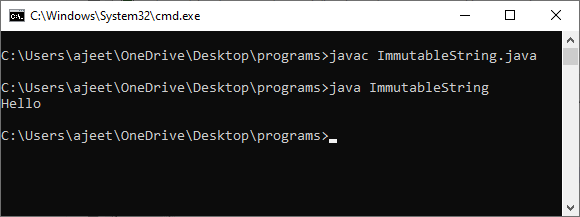Unalterable Strings: A Trick Component in Ensuring Information Consistency and Dependability
In the realm of information administration, the relevance of immutable strings can not be overstated. The principle of immutable strings goes beyond plain triviality; it is a cornerstone in the complicated internet of information governance.
The Idea of Immutable Strings
Unalterable strings, an essential principle in programming, describe strings that can not be changed when they are produced. Essentially, as soon as a string value is designated, any procedure that appears to modify the string actually creates a new string. This immutability guarantees information consistency and integrity in applications, as it protects against unforeseen adjustments to the original information.
Advantages in Data Consistency

Data consistency is essential in numerous aspects of software application growth, consisting of data source management, multi-threaded settings, and dispersed systems (Why are strings immutable in Java?). Unalterable strings add substantially to attaining this consistency by protecting against data corruption as a result of simultaneous accessibility. In scenarios where numerous processes or threads interact with the very same information simultaneously, unalterable strings act as a protect versus race problems and synchronization concerns
Additionally, the immutability of strings streamlines debugging and testing processes. With unalterable strings, designers can trust that when a string is set, it will stay unmodified, making it much easier to trace the source of errors and making certain that examination cases create regular results. This integrity in data dealing with inevitably results in extra durable and secure applications.

Implementing Immutable Strings
Ensuring the immutability of strings needs a thoughtful technique to their execution in software program advancement. One vital strategy is to develop string courses in a manner that stops modifications as soon as a string object is produced. By making strings immutable, programmers can enhance data consistency and integrity in their applications.
To implement unalterable strings effectively, designers should prefer producing brand-new string items rather than modifying existing ones. This method makes certain that once a string is assigned a value, it can not be transformed. Furthermore, any kind of procedure that shows up to change the string should develop a new string with the preferred modifications rather than modifying the initial.
Additionally, making use of immutable strings can streamline concurrency management in multi-threaded environments. Because unalterable strings can not be changed after development, they can be securely shared among several strings without the risk of data corruption.
Function in Reliability Guarantee
In software program growth, the usage of unalterable strings plays a crucial duty in guaranteeing the dependability of information operations. Unalterable strings, once created, can not be modified, guaranteeing that the information they stand for stays consistent throughout the application's implementation. This immutability residential or commercial property supplies a level of guarantee that the information being refined will not be accidentally altered, resulting in unanticipated results or errors in the system.
By incorporating immutable strings right into software application style, designers can boost the integrity of their applications by reducing the risks associated with mutable information - Why are strings immutable in Java?. Unalterable strings help my website in stopping information corruption or unintentional alterations, which can be specifically essential when managing delicate information or when data honesty is vital
Furthermore, using immutable strings streamlines concurrent processing, as several threads can securely accessibility and share string information without the threat of one string altering the web content while one more reads it. This element contributes dramatically to the overall reliability of the software system, guaranteeing foreseeable and consistent behavior in information taking care of procedures.
Applications and System Assimilation
The smooth combination of immutable strings right into numerous applications and systems is essential for making sure durable information uniformity and integrity throughout varied technological environments - Why are strings immutable in Java?. Immutable strings play a vital role in boosting the honesty of data exchanges and interactions within complicated software communities. By including immutable strings into applications, programmers can reduce the dangers related to data tampering, unauthorized adjustments, and unintended alterations, thereby fortifying the general safety stance of the system
In the context of system combination, immutable strings act as a fundamental element for developing protected communication networks and helping with smooth data transfers between different parts. Their immutable nature ensures that data transmitted in between systems continues to be unchanged and proven, reducing the possibility of variances or mistakes that could jeopardize the integrity of the whole system. In addition, unalterable strings can improve interoperability between inconsonant systems by giving a standard layout for data depiction, making it possible for much more efficient data processing and exchange protocols across interconnected platforms. By taking on unalterable strings in applications and system integration processes, companies can strengthen their information framework and maintain the dependability and consistency of their details possessions.
Verdict
To conclude, unalterable strings play a vital duty in keeping information uniformity and dependability in different applications and system combinations. By guaranteeing that strings can not be altered when created, the honesty of data is protected, lowering the threat of errors and incongruities. Implementing immutable strings can dramatically enhance the dependability of systems, eventually bring about even more dependable Look At This and accurate data processing.
